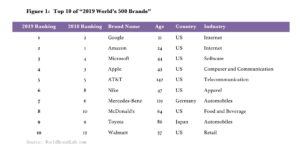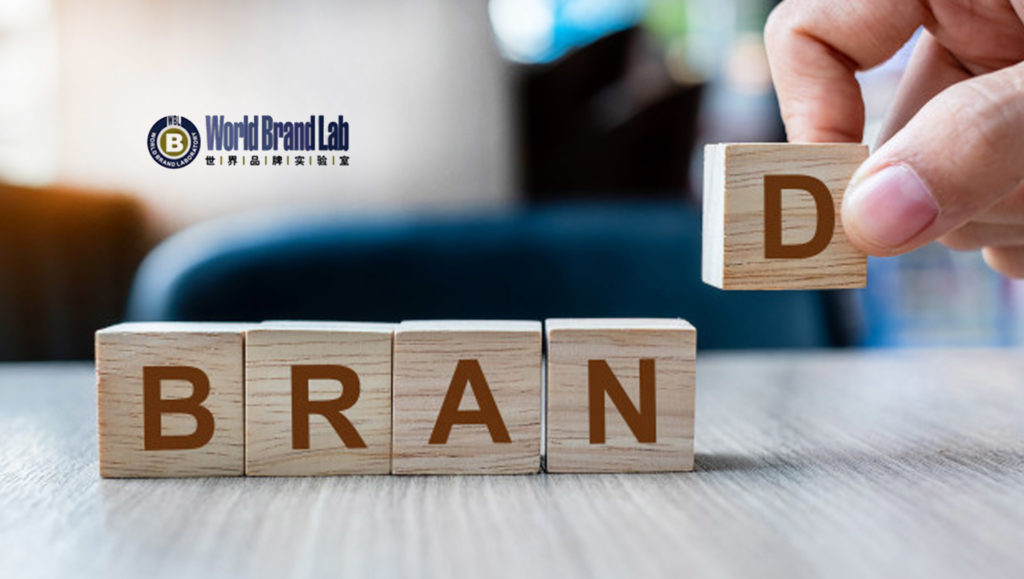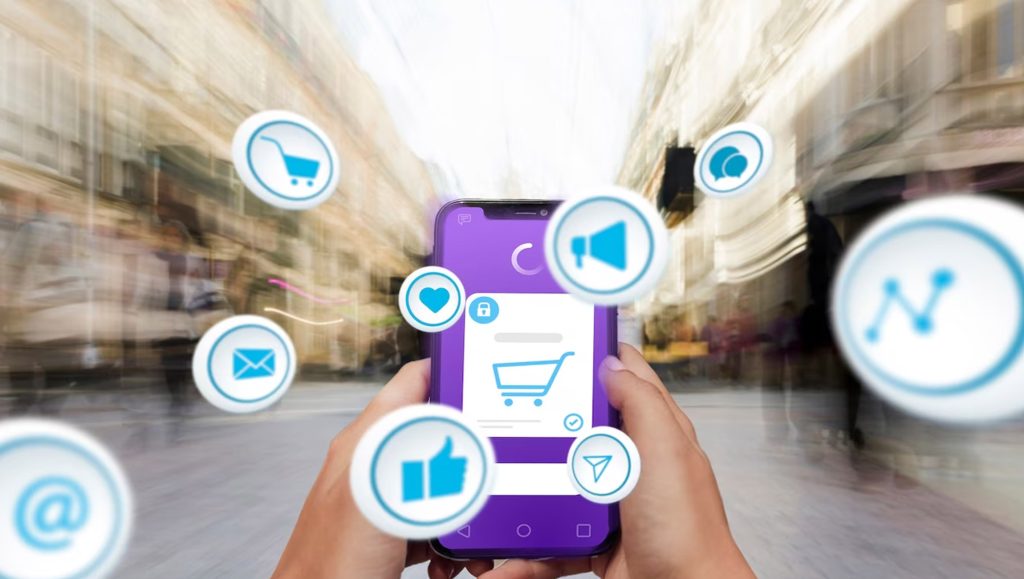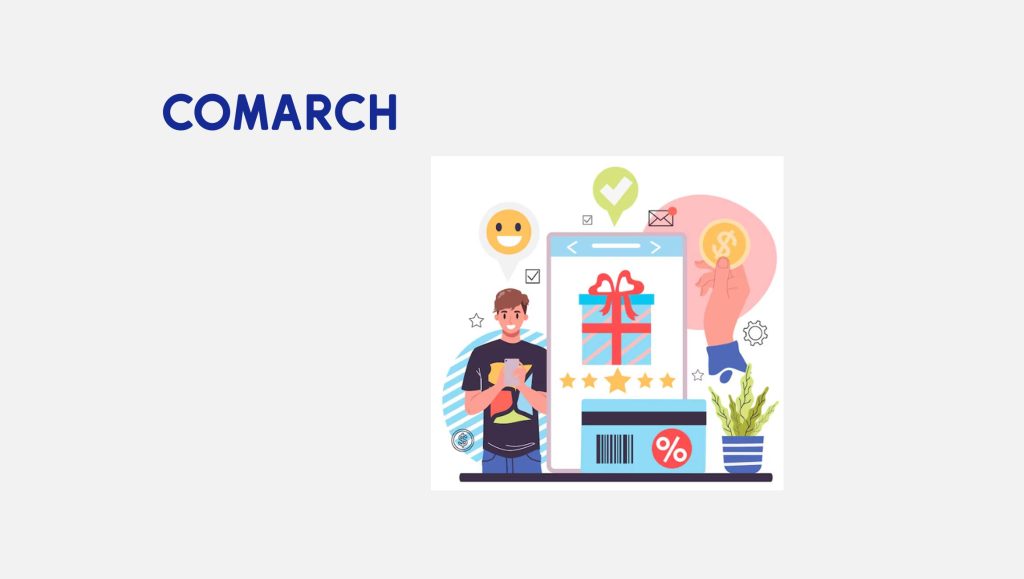World Brand Lab today released its “2019 World’s 500 Most Influential Brands” list. Benefiting from business growth in cloud computing and self-driving technology, last year’s runner-up Google beat Amazon to top the list while Amazon dropped to second place.
Microsoft, which saw a sharp increase in net profit last year, ranked third. China has only 40 brands selected, which does not match its status of the second-largest economy. Among the prominent Chinese brands are State Grid, Tencent, China Life, China Resources, Changhong, Tsingtao Brewery, Sinochem, Wuliangye, Air China, CASIC, Hengli, China Everbright Group, and XCMG.

Based on global influence, the ranking of the World’s 500 Brands has been released for 16 consecutive years. Brand influence refers to the ability of a brand to enter a market, capture market shares and earn profits. Following three key indicators of brand influence—Market Share, Brand Loyalty and Global Leadership, World Brand Lab tracked more than 80000 famous brands around the globe and eventually launched the World’s 500 Most Influential Brands list.
Read More: SalesTech Star Interview With John Moore, VP Of Customer Success At Bigtincan
500 Brands from 29 Countries
The 2019 World’s 500 Brands list includes brands from 29 countries. The U.S. represents 208 out of the top 500, retaining its position as the brand superpower. UK and France, have 44 and 43 brands, respectively, ranking second and third. Japan, China, Germany, Switzerland, and Italy represent the second tier of brand powerhouses, with 42, 40, 27, 21, and 14 brands, respectively. Although 40 brands are selected from China, Chinese brands are still in the “third world”, despite the country’s 1.3 billion population and its status as the second-largest economy in the world.
Thirty-five brands are new to the list this year. These brands are scattered across various countries. Among the newly listed brands, China Resources, is ranked 78th. With the mission of “leading business progress and creating better living together”, China Resources has been continuously innovating its business models and creating product and service brands, to effectively promote industrial development and contribute to improving the quality of public life. Other famous brands such as Martell, Daikin, and Costa were also on the list. Some Chinese brands that are new to the list–China Everbright Group, XCMG, and Weiqiao–have made outstanding achievements in their respective fields, and these brands’ international reputation has been continuously improving.
Read More: Artificial Intelligence In B2C Marketing At A Nascent Stage In Middle East, Says Survey
H&M, the Brand That Fell the Most
H&M saw a continuous decline in sales, thus becoming the brand that fell the most this year. The automotive industry is experiencing trouble with the largest declines, with General Motors, Nissan, and Tesla ranking third, eighth, and ninth, respectively. Dulux is a well-known paint brand of AkzoNobel. Its products are sold in 100 countries around the world. During the past year, there were some scandals regarding its environmental and corporate governance, which affected its brand value and directly led to dropping out of the list.
The average age of brands in the 2019 World’s 500 Brands list reached 101.93 years old, slightly higher than 100.14 of last year. 217 listed brands are more than a century old. The United States accounts for 40% with 90 brands. Oxford and Cambridge, are listed as the top two oldest brands.
Saint-Gobain Is the Longest Running Brand
France’s Saint-Gobain is the longest-running brand in the business world with 354 years in operation. Among the 40 brands from China, only Moutai, Tsingtao Brewery, Wuliangye, and Bank of China can boast more than 100 years in business. By industry, brands in the food and beverage industry are the oldest, with 29 selected brands over the age of 100.
Read More: Three Out Of Five Shoppers Check Prices Online While Shopping In-Store
Regarding the global brand competition in the digital age, Professor Adam Galinsky of Columbia Business School believes that “In the global marketplace, where brand competition is fierce, companies often face unexpected crises, often of their own making. How do we get the crisis back into its bottle and mitigate any brand damage? The key solution is a simple but profound one, offering a Quick, Open, Remorseful, Committing to change apology.” Professor Ziv Carmon of INSEAD comments that “I think the performance of American and Chinese brands deserves attention. The strength of French, British, Japanese, Italian and German brands is not surprising—their performance roughly corresponds to the size of their economies.”
Since 2013, World Brand Lab has tracked more than 80,000 major brands in 60 countries and has established the largest brand database in the world. World Brand Lab, the leading brand consulting, research and evaluation firm, is chaired by Professor Robert Mundell, 1999’s Nobel laureate in Economics, and is wholly owned by World Executive Group. World Brand Lab is dedicated to brand valuation, brand strategy, brand naming, brand design, and brand protection.





















